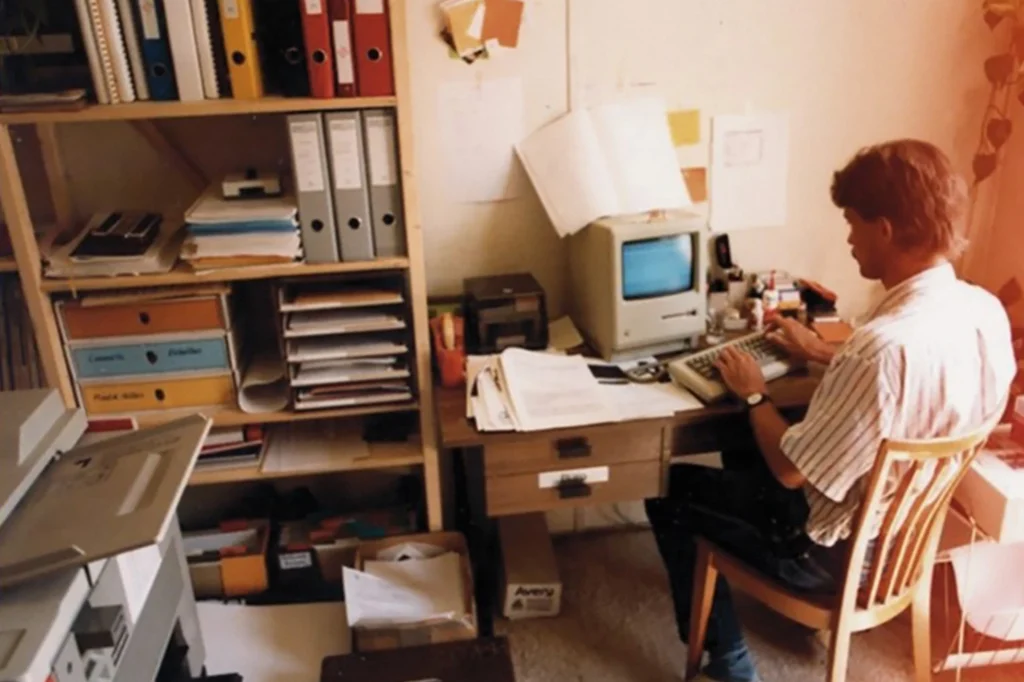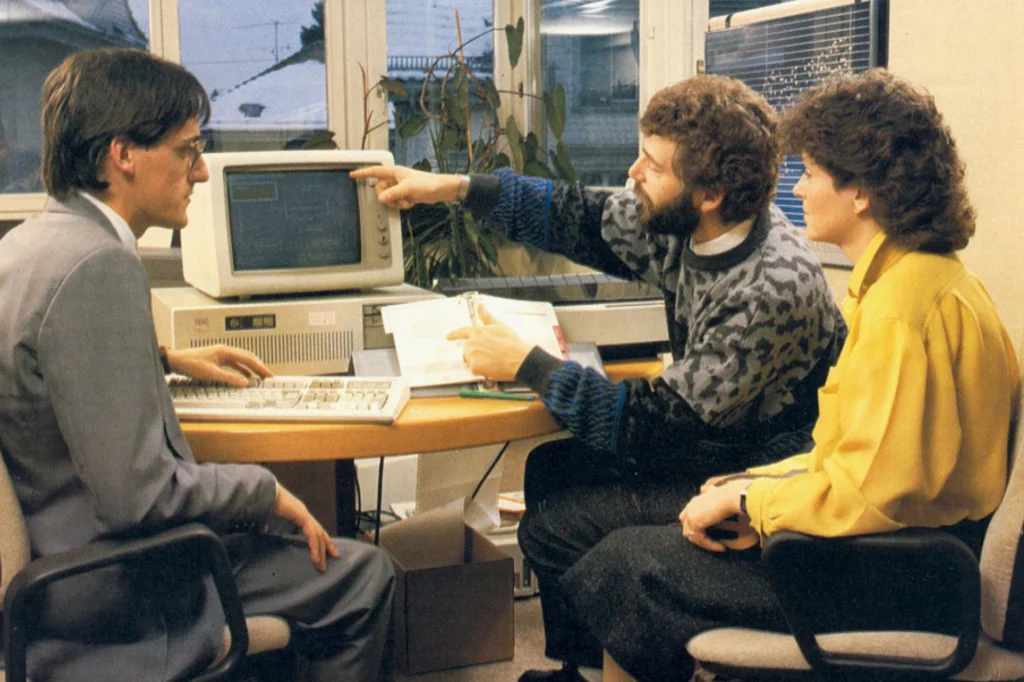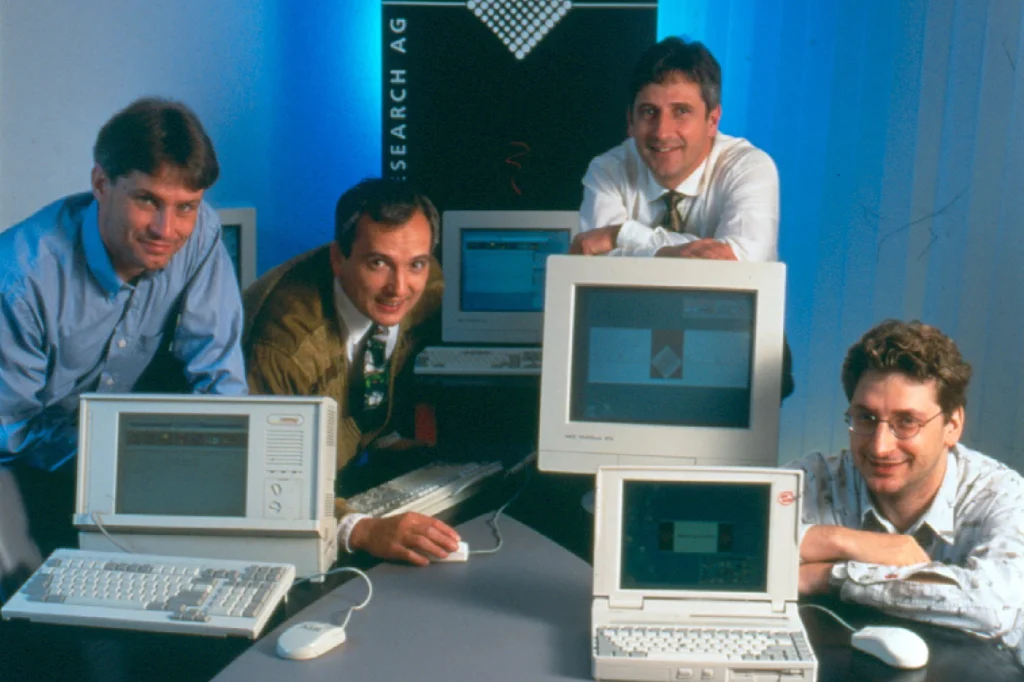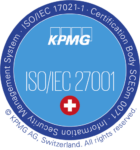
DeepDay 2025: a look at our AI-powered product ecosystem
5 December 2025
We highlight Abacus milestones and show how they shaped our path at DeepCloud. From early ERP steps to the Browser Edition





Recently we took part in Abacus’s 40th-anniversary celebration—a day full of emotion and the perfect opportunity to look back on the remarkable history of our parent company.
It all began in 1985, in a student apartment in St. Gallen, where Claudio Hintermann, Thomas Köberl and Eliano Ramelli brought Abacus to life. A bold idea, born of a shared vision, that has become a pillar of business digitalisation in Switzerland.
There was no grand plan, just a clear observation: many everyday office tasks could be solved more simply if software were built closer to real-world practice. From that mindset came a handful of modules, and over the years an ecosystem took shape. One that is reliably supporting companies across Switzerland. For us at DeepCloud, this story is more than an anniversary. It’s the ground we grew from, and the context in which we contribute.
Mid-80s to 2000s – Foundations and steady progress
In these first years, Abacus tackled complex day-to-day requirements on early PCs and turned them into dependable software. Modules were shipped, tested in real use, and improved until they worked as one suite.
What set the company apart was the combination the founders brought: a solid business education from the University of St Gallen and hands-on programming experience. They built the first finance and payroll modules themselves, keeping product decisions close to real accounting practice.
The team set clear standards for quality and release cadence, earned the trust of early customers, and established a reputation for reliability and local support. It wasn’t effortless work, but the discipline paid off: a solid platform took shape—rooted in Switzerland and ready to grow.
Late 2000s to today – From desktop to web
As Abacus moved online, installed programmes gave way to a shared, browser-based workspace. With AbaWeb, the SaaS model took hold, letting companies and fiduciary firms work in the same environment without heavy client installs. The Browser Edition now carries that idea further: applications run directly in the browser across PC, notebook and tablet, reducing setup and smoothing collaboration.
Practical enablers make this shift tangible: the new AbaMenu streamlines access with search and configurable widgets, and the Abacus Office add-ins link Word, Excel, PowerPoint and Outlook to Abacus as a central document store.
The outcome shows in day-to-day scale: In payroll alone, more than 1.5 million payslips are processed each month with Abacus—volume that, set against Switzerland’s employed population (≈5.36 million in Q2 2025), works out to roughly one in four salary statements. Independent market studies tell a similar story: Abacus is the most-used ERP in Switzerland, leading recent rankings with around 17% market share ahead of SAP.
2020s – A spin-off comes into its own: DeepCloud
Against this backdrop, DeepCloud was founded in 2020 as an Abacus spin-off. Our mandate was simple from the start: make collaboration easier and safer, on the cloud. To do that, we build services like DeepO (AI-assisted data capture), DeepBox (sharing and storing documents), and DeepSign (digital signatures) – closely integrated with Abacus yet deliberately independent, so they can create value wherever they are needed.
The approach proved itself early: by 2023, DeepO had processed more than one million documents. DeepSign is now used by organisations such as Migros Ostschweiz and by public authorities, including the City of Zurich and units of the Canton of Basel-Stadt. And in April 2025 the Canton of St. Gallen selected DeepSign as its official e-signature solution. For us, these are practical signals that small, well-fitted solutions scale in everyday work.
Common threads
Our link to Abacus isn’t just historical. It shows up in concrete, everyday flows. Supplier invoices land in DeepBox, where DeepO reads supplier, amounts and VAT, routes the document for checking, and hands structured data to Abacus for posting and archiving—an end-to-end path used in practice (for example at the energy services company ewl in Lucerne) that removes manual entry and speeds approvals.
In HR, employment contracts can be issued and signed digitally with DeepSign (and DeepID for identity checks), then filed back to DeepBox and referenced from Abacus; PHBern, for instance, signs up to 1,000 contracts a year this way, and Abacus also supports digital signing directly in its Business Software.
Looking ahead
From the first finance modules to today’s Browser Edition, Abacus has been strongest when it works from real client needs turning practical requirements into dependable services and improving them release by release. That thread runs through the past forty years and remains the most reliable guide for what comes next.
Warm congratulations to Abacus on its anniversary. We look forward to the next chapter.
Contact
DeepCloud certificates

Information security management for hosting services, in accordance with the Statement of Applicability.

Unattended remote identity proofing with hybrid manual and automated operation according to the international standard ETSI.